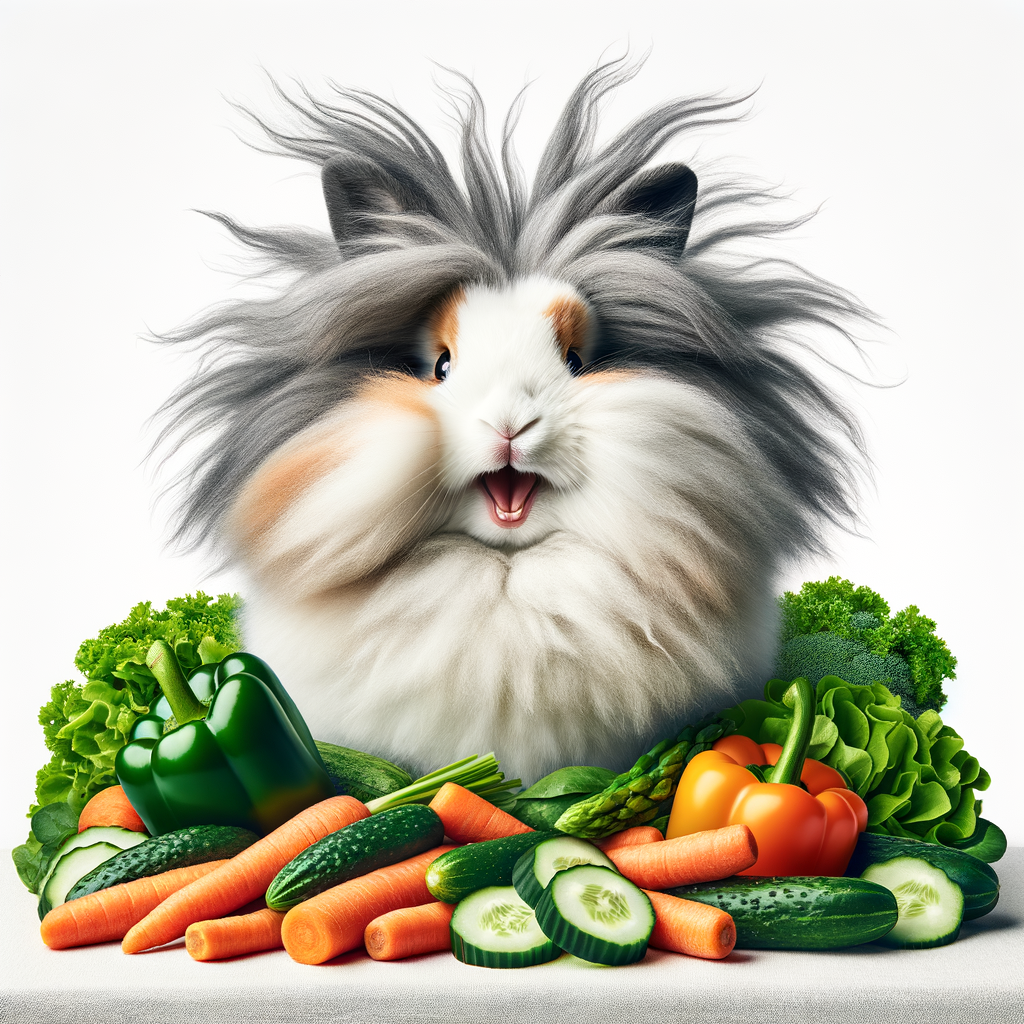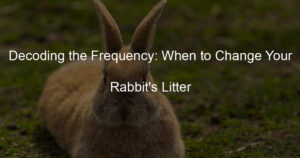
Introduction to Lionhead Rabbit Diet
When it comes to keeping your Lionhead Rabbit healthy and happy, one of the most crucial factors to consider is their diet. Just like humans, these adorable creatures require a balanced diet to thrive. In this section, we will delve into the importance of a balanced diet for a Lionhead Rabbit and understand their nutritional needs.
- Importance of a balanced diet for a Lionhead Rabbit
- Understanding the nutritional needs of a Lionhead Rabbit
A balanced diet is the cornerstone of a Lionhead Rabbit’s health. It not only helps them maintain a healthy weight, but it also boosts their immune system, ensuring they are less susceptible to diseases. A balanced diet for a Lionhead Rabbit includes hay, fresh vegetables, and a small amount of pellets. Hay should make up about 70% of their diet as it aids in digestion and dental health. Fresh vegetables provide necessary vitamins and minerals, while pellets offer concentrated nutrition.
Understanding the nutritional needs of your Lionhead Rabbit is key to ensuring they live a long, healthy life. These rabbits require a diet rich in fiber, low in fat, and balanced in protein and carbohydrates. Fiber is essential for their digestive health, while protein supports growth and repair. Carbohydrates provide energy, and a low-fat diet helps prevent obesity. They also need access to clean, fresh water at all times.
In the following sections, we will explore safe vegetables for rabbits, nutritious rabbit food, and other aspects of a healthy rabbit diet. We will also provide a list of safe foods for Lionhead Rabbits and discuss the benefits of various nutritious vegetables for rabbits. Stay tuned to learn more about how to keep your Lionhead Rabbit healthy and happy through proper nutrition.
Safe Vegetables for Rabbits
When it comes to feeding your rabbit, it’s essential to know which vegetables are safe. One category of safe vegetables for rabbits is leafy greens. Let’s explore this further.
Leafy Greens
Leafy greens are a crucial part of a rabbit’s diet. They provide essential vitamins and minerals that help keep your rabbit healthy. But not all leafy greens are safe for rabbits. Let’s take a look at the types of safe leafy greens for rabbits and their benefits.
- Types of safe leafy greens for rabbits
- Benefits of leafy greens in a rabbit’s diet
Rabbits can safely eat a variety of leafy greens. Some of these include romaine lettuce, kale, spinach, and bok choy. Other safe options are parsley, cilantro, and mint. It’s important to wash these greens thoroughly before feeding them to your rabbit to remove any pesticides or harmful chemicals.
Leafy greens are packed with nutrients that are beneficial for rabbits. They are a great source of fiber, which aids in digestion and prevents obesity. They also contain vitamins A, C, and K, which support the immune system, promote healthy skin and coat, and aid in blood clotting, respectively. Moreover, leafy greens help keep your rabbit hydrated as they contain a high water content.
In conclusion, leafy greens are a safe and nutritious addition to your rabbit’s diet. However, it’s important to remember that while they provide many benefits, they should not make up the majority of your rabbit’s diet. Hay should still be the primary food source for your rabbit, with leafy greens, other vegetables, and a small amount of pellets making up the rest.
Non-Leafy Vegetables
Just like humans, rabbits also need a balanced diet to stay healthy. While leafy greens are essential, non-leafy vegetables also play a significant role in a rabbit’s diet. Let’s explore the types of safe non-leafy vegetables for rabbits and their benefits.
- Types of Safe Non-Leafy Vegetables for Rabbits
When it comes to non-leafy vegetables, rabbits can safely consume a variety of them. Some of the most popular non-leafy vegetables include:
| Vegetable | Description |
|---|---|
| Carrots | Carrots are a rabbit favorite, but due to their high sugar content, they should be given in moderation. |
| Broccoli | Broccoli is rich in vitamins and can be a nutritious addition to a rabbit’s diet. However, it should be introduced slowly to avoid digestive issues. |
| Bell Peppers | Bell peppers, regardless of color, are safe for rabbits and are a good source of vitamin C. |
| Cucumbers | Cucumbers are mostly water, so they can help keep your rabbit hydrated. They should be given as a treat, not a staple food. |
- Benefits of Non-Leafy Vegetables in a Rabbit’s Diet
Non-leafy vegetables offer a range of benefits to a rabbit’s health. Here are a few key benefits:
- Nutrient-Rich: Non-leafy vegetables are packed with essential nutrients like vitamins and minerals that are crucial for a rabbit’s health.
- Digestive Health: The fiber content in these vegetables aids in digestion and helps prevent gastrointestinal issues.
- Hydration: Vegetables like cucumbers and bell peppers have high water content, which can help keep your rabbit hydrated.
- Variety: Including non-leafy vegetables in a rabbit’s diet adds variety, making meal times more exciting for your furry friend.
In conclusion, non-leafy vegetables are a safe and beneficial addition to a rabbit’s diet. However, like all foods, they should be introduced gradually and given in moderation to prevent any digestive issues.
Nutritious Rabbit Food
When it comes to feeding your rabbit, it’s important to provide a balanced diet that includes a variety of nutritious foods. One such food is pellets, which are a staple in a rabbit’s diet.
Pellets
Pellets are a type of food that is specially designed for rabbits. They are made from a combination of hay, vegetables, and a variety of other ingredients. Here are some key points to consider when feeding your rabbit pellets.
- Choosing the right pellets for your rabbit
- How much and how often to feed pellets
Not all pellets are created equal. Some are packed with more nutrients than others. When choosing pellets for your rabbit, look for those that are high in fiber and low in fat. Fiber is essential for a rabbit’s digestion, while too much fat can lead to obesity. Also, avoid pellets with added sugar or artificial colors, as these can be harmful to your rabbit.
The amount of pellets you should feed your rabbit depends on their size, age, and health status. As a general rule, an adult rabbit should be fed about 1/4 cup of pellets per 5 pounds of body weight each day. Younger rabbits, on the other hand, can be fed unlimited pellets, as they need more nutrients for growth. It’s best to feed your rabbit their pellets in the morning and evening, dividing the total daily amount into two servings.
Remember, while pellets are an important part of a rabbit’s diet, they should not be the only food your rabbit eats. Hay, fresh vegetables, and water should also be provided daily for a balanced diet.
Hay: A Vital Part of a Rabbit’s Diet
When it comes to feeding your rabbit, hay is an essential part of their diet. It not only provides the necessary nutrients, but also aids in their digestion and dental health. Let’s delve into the importance of hay in a rabbit’s diet and explore the different types of hay suitable for rabbits.
- Importance of Hay in a Rabbit’s Diet
- Different Types of Hay Suitable for Rabbits
Hay is a crucial part of a rabbit’s diet for several reasons. Firstly, it provides the fiber necessary for a healthy digestive system. Rabbits have a unique digestive system that requires a high amount of fiber to function properly. Hay, being rich in fiber, helps to keep their gut moving and prevents issues like GI stasis, a potentially fatal condition in rabbits.
Secondly, hay helps to maintain a rabbit’s dental health. Rabbits’ teeth grow continuously throughout their lives. Chewing on hay helps to grind down their teeth and prevent overgrowth, which can lead to serious health problems.
Lastly, hay also provides a source of entertainment for rabbits. They enjoy digging, chewing, and playing in it, which can help to alleviate boredom and provide mental stimulation.
There are several types of hay that are suitable for rabbits. The most common types include Timothy hay, Meadow hay, and Orchard grass hay. Let’s take a closer look at each of these:
| Type of Hay | Description |
|---|---|
| Timothy Hay | Timothy hay is a popular choice for rabbits. It is high in fiber and low in protein and calcium, making it a balanced option for adult rabbits. |
| Meadow Hay | Meadow hay is a mixture of grasses, which provides a variety of textures and flavors for your rabbit. It is also high in fiber and is a good option for rabbits of all ages. |
| Orchard Grass Hay | Orchard grass hay is a soft and leafy hay that is high in fiber and low in protein and calcium. It is a good alternative for rabbits who are allergic to Timothy hay. |
It’s important to note that while all these types of hay are suitable for rabbits, the best type of hay for your rabbit will depend on their age, health, and personal preference.
Fresh Vegetables for Bunnies
When it comes to keeping your bunny healthy and happy, fresh vegetables play a crucial role. They provide essential nutrients that your bunny needs to thrive. Let’s delve into the benefits of fresh vegetables in a rabbit’s diet and how to introduce them to your bunny.
- Benefits of Fresh Vegetables in a Rabbit’s Diet
- Vitamins and Minerals: Fresh vegetables are rich in vitamins and minerals that boost your bunny’s immune system and keep them healthy.
- Fiber: Vegetables provide the much-needed fiber that aids in digestion and prevents gastrointestinal problems in rabbits.
- Hydration: Fresh vegetables have high water content, which helps keep your bunny hydrated.
- How to Introduce Fresh Vegetables to Your Bunny’s Diet
- Start Small: Begin by offering small amounts of a single type of vegetable. This allows your bunny to get used to the new food.
- Monitor Your Bunny: Watch your bunny for any signs of discomfort or digestive issues. If your bunny seems fine, you can gradually increase the amount and variety of vegetables.
- Variety is Key: Once your bunny is comfortable with one type of vegetable, introduce others one at a time. This ensures your bunny gets a wide range of nutrients.
Vegetables are a treasure trove of nutrients for your bunny. They are packed with vitamins, minerals, and fibers that are essential for your bunny’s health. Here are some key benefits:
Introducing fresh vegetables to your bunny’s diet should be a gradual process. Here’s a simple guide to help you:
In conclusion, fresh vegetables are a vital part of a bunny’s diet. They not only provide essential nutrients but also help keep your bunny hydrated and aid in digestion. Remember, the introduction of fresh vegetables should be gradual and monitored to ensure your bunny’s health and comfort.
Can Rabbits Eat Vegetables?
When it comes to feeding your pet rabbit, you might wonder, “Can rabbits eat vegetables?” The answer is yes, but not all vegetables are safe for rabbits. Understanding the digestive system of a rabbit and knowing which vegetables are harmful can help you provide a healthy diet for your furry friend.
- Understanding the digestive system of a rabbit
- Vegetables that are harmful to rabbits
Rabbits have a unique digestive system. They are hindgut fermenters, which means they have a specialized part of the gut that allows them to extract additional nutrients from their food after the initial digestion. This is why they eat their own droppings, a behavior known as coprophagy. It’s a vital part of their diet and helps them get all the nutrients they need.
Because of their unique digestive system, rabbits need a diet high in fiber. Vegetables can provide some of this fiber, but it’s important to choose the right ones. Some vegetables can cause digestive problems or even be toxic to rabbits.
While many vegetables are safe and healthy for rabbits, some can cause harm. For example, onions, garlic, and other plants in the allium family are toxic to rabbits. They can cause anemia and other health problems.
Other vegetables to avoid include iceberg lettuce, which can cause diarrhea, and rhubarb, which is toxic. Potatoes and other vegetables high in starch can also be harmful because rabbits can’t digest starch well.
It’s important to remember that even safe vegetables should only make up a small part of a rabbit’s diet. The majority of their diet should be hay, which provides the high fiber they need for their digestive system to function properly.
In conclusion, while rabbits can eat vegetables, it’s important to choose the right ones and feed them in moderation. Always do your research before introducing a new food into your rabbit’s diet, and when in doubt, consult with a vet.
Healthy Rabbit Diet
Feeding your rabbit a balanced diet is crucial for their health and happiness. A proper diet helps rabbits grow strong, stay active, and live a long, healthy life. Let’s take a look at the proportion of different foods that should make up a rabbit’s diet.
Proportion of Different Foods
Every rabbit is unique, and their diet should reflect their individual needs. However, there are general guidelines you can follow to ensure your rabbit is getting the right nutrients.
- Recommended proportion of vegetables, hay, and pellets in a rabbit’s diet
- Adjusting the diet based on the rabbit’s age and health condition
A healthy rabbit diet primarily consists of hay, supplemented with a variety of fresh vegetables and a small amount of pellets. Here’s a simple breakdown:
| Food Type | Proportion |
|---|---|
| Hay | 70% |
| Fresh Vegetables | 25% |
| Pellets | 5% |
Hay should make up about 70% of your rabbit’s diet. It’s high in fiber, which is essential for a rabbit’s digestive health. Fresh vegetables should account for about 25% of their diet. They provide important vitamins and minerals. Lastly, pellets should make up about 5% of the diet. They’re a concentrated source of nutrients, but should be given in moderation to prevent obesity.
Just like humans, rabbits’ dietary needs change as they age. Young rabbits need more protein for growth, while older rabbits may need fewer calories to prevent weight gain. Rabbits with health conditions may also require special diets. For example, a rabbit with dental problems may need softer foods, while one with a sensitive stomach may need a diet lower in sugar and starch. Always consult with a vet to determine the best diet for your rabbit’s specific needs.
Remember, a healthy diet is key to a happy, healthy rabbit. By providing the right proportions of hay, vegetables, and pellets, and adjusting the diet as needed, you can help ensure your rabbit thrives.
Lionhead Bunny Food Options
Feeding your Lionhead bunny a balanced diet is crucial for their health and happiness. There are two main types of food options available for your bunny: commercially available food and homemade food. Let’s explore these options in detail.
- Commercially available food options for Lionhead Rabbits
Commercially available food options are specially designed to provide all the necessary nutrients for your Lionhead bunny. These include rabbit pellets, hay, and pre-packaged rabbit food. Here’s a quick look at these options:
| Food Type | Description |
|---|---|
| Rabbit Pellets | Pellets are a great source of fiber and protein. They are easy to store and serve. |
| Hay | Hay is essential for a rabbit’s diet. It aids in digestion and provides necessary fiber. |
| Pre-packaged Rabbit Food | These foods are convenient and contain a mix of nutrients. However, they should not replace fresh food in your bunny’s diet. |
- Homemade food options for Lionhead Rabbits
Homemade food options allow you to control what goes into your bunny’s diet. These include fresh vegetables, fruits, and herbs. Remember, not all fruits and vegetables are safe for rabbits. Always research before introducing a new food to your bunny’s diet.
| Food Type | Description |
|---|---|
| Fresh Vegetables | Vegetables like carrots, bell peppers, and leafy greens are great for your bunny. They provide essential vitamins and minerals. |
| Fruits | Fruits should be given in moderation due to their high sugar content. Apples, pears, and bananas are good options. |
| Herbs | Herbs like parsley, dill, and cilantro can be a tasty treat for your bunny. |
In conclusion, a balanced diet for your Lionhead bunny should include a mix of commercially available and homemade food options. Always monitor your bunny’s health and adjust their diet as needed.
Safe Foods for Lionhead Rabbits
Feeding your Lionhead rabbit a balanced diet is vital for their health and happiness. Let’s explore some safe foods, including fruits and treats, that you can incorporate into your furry friend’s diet.
- Safe fruits for Lionhead Rabbits
- Apples (without seeds)
- Pears
- Bananas (in small amounts)
- Blueberries
- Strawberries
- Safe treats for Lionhead Rabbits
- Rabbit-safe pellets
- Hay-based treats
- Vegetable-based treats
Fruits are a great way to add variety to your Lionhead rabbit’s diet. However, they should be given in moderation due to their high sugar content. Here are some safe fruits for your Lionhead rabbit:
Remember to wash all fruits thoroughly before feeding them to your rabbit to remove any pesticides. Also, introduce new fruits gradually to avoid upsetting your rabbit’s stomach.
Treats can be a fun way to reward your Lionhead rabbit and strengthen your bond. However, not all treats are created equal. Here are some safe treats for your Lionhead rabbit:
Always check the ingredients of any store-bought treats to ensure they are safe for your rabbit. Avoid treats with added sugars, artificial colors, or preservatives. Homemade treats made from rabbit-safe foods can also be a healthy option.
In conclusion, a variety of safe fruits and treats can enhance your Lionhead rabbit’s diet. Always remember to introduce new foods gradually and monitor your rabbit for any changes in behavior or digestion. If in doubt, consult with your vet before introducing new foods into your rabbit’s diet.
Nutritious Vegetables for Rabbits
Feeding your rabbit a balanced diet is essential for their health and well-being. One of the best ways to ensure this is by incorporating nutritious vegetables into their meals. Let’s explore the benefits of feeding nutritious vegetables to rabbits and some examples of these vegetables.
- Benefits of feeding nutritious vegetables to rabbits
- Examples of nutritious vegetables for rabbits
Vegetables are packed with vitamins, minerals, and fiber that are essential for a rabbit’s health. They aid in digestion, promote a healthy coat, and boost the immune system. A diet rich in vegetables also helps prevent obesity, a common problem in pet rabbits. Furthermore, the variety of textures and flavors in vegetables can make mealtime more enjoyable for your furry friend.
There are many vegetables that are safe and beneficial for rabbits. Here are a few examples:
| Vegetable | Benefits |
|---|---|
| Carrots | High in Vitamin A, good for eye health |
| Broccoli | Rich in antioxidants and fiber |
| Spinach | Packed with iron and calcium |
| Bell peppers | High in Vitamin C, boosts immune system |
| Cucumber | Hydrating and low in calories |
Remember, while these vegetables are nutritious, they should be fed in moderation as part of a balanced diet that also includes hay, pellets, and water.
Feeding your rabbit a variety of nutritious vegetables not only contributes to their overall health but also adds variety to their diet, making mealtime a fun and exciting part of their day. So, next time you’re planning your rabbit’s meals, consider adding some of these nutritious vegetables.




